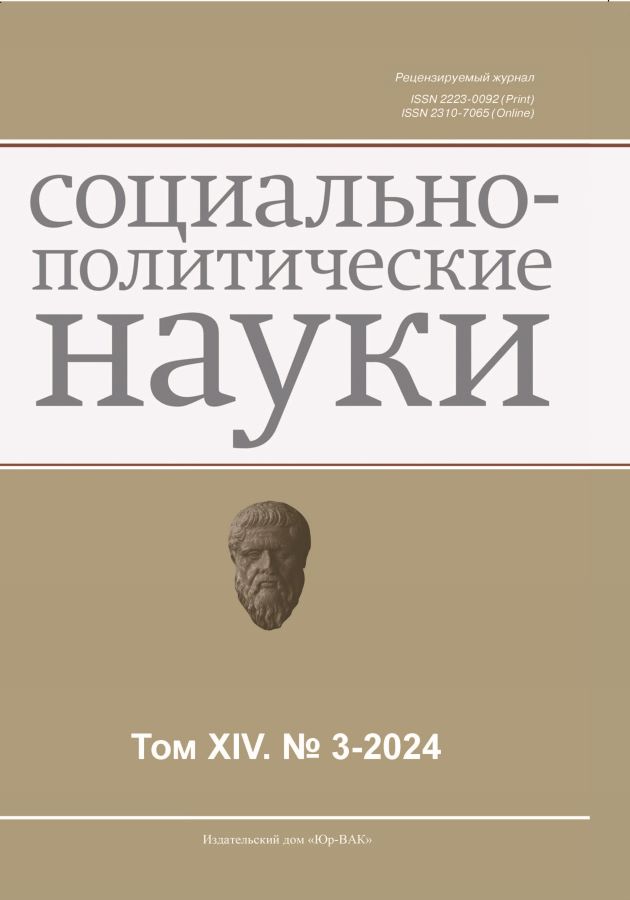Public perception of the risks of using smart technologies in the digital management of a modern city
- Autores: Garaganov A.V.1
-
Afiliações:
- Financial University under the Government of the Russian Federation
- Edição: Volume 14, Nº 3 (2024)
- Páginas: 143-149
- Seção: Sociology of management
- URL: https://journals.eco-vector.com/2223-0092/article/view/635485
- DOI: https://doi.org/10.33693/2223-0092-2024-14-3-143-149
- EDN: https://elibrary.ru/KWAUAG
- ID: 635485
Citar
Texto integral
Resumo
The article provides a comprehensive analysis of current trends and concerns related to the implementation of AI in city government. Important issues are raised that require further study and solutions to ensure public confidence in smart technologies. AI, neural networks and the Internet of things are having an increasing impact on the management of urban spaces. Innovation opens up opportunities to improve the efficiency of city services, communities, optimize resources and improve the quality of life. However, IT implementation is also associated with certain risks that require study and expert assessment. Analysis of public perception of the risks associated with the use of intelligent technologies in the management of modern digital cities plays a key role in the adoption and further development of progressive technological initiatives, including the spaces of “smart” megacities. There has been a tendency towards the frequent use of AI and IT for urban management, which citizens note as an opportunity to improve the quality of life and optimize costs.
Palavras-chave
Texto integral
Sobre autores
Artur Garaganov
Financial University under the Government of the Russian Federation
Autor responsável pela correspondência
Email: arturcompany21@gmail.com
researcher, Center “Locomotives of Growth”, Department of Sociology
Rússia, MoscowBibliografia
- Vershinina I.A. Social relations in the big city. Moscow: Center for Ethnic and International Studies, 2024. 160 p. ISBN: 978-5-6049897-5-3. EDN: HHEEAL.
- Garaganov A.V. Intellectual technologies and cyber-dependent behavior of youth. Bulletin of the State University. 2024. No. 2. Pp. 257–265. (In Rus.) EDN: UMMIVP.
- Garaganov A.V. Development of the potential of intelligent technologies in the management of the security of a modern city. Socio-political Sciences. 2024. Vol. 14. No. 2. Pp. 177–182. (In Rus.). doi: 10.33693/2223-0092-2024-14-2-177-182. EDN: HPDXXW.
- Garaganov A.V. How intelligent technologies change society and the space of a big city. Socio-political Sciences. 2024. Vol. 14. No. 1. Pp. 96–101. (In Rus.). doi: 10.33693/2223-0092-2024-14-1-96-101. EDN: COODXI.
- Razov P.V., Garaganov A.V. The influence of the media on the formation of trust in digital platforms. SEARCH: Politics. Social Studies. Art. Sociology. Culture. 2023. No. 1 (96). Pp. 98–106. (In Rus.). EDN: GWTDEH.
- Revko P.S. Artificial intelligent systems in human daily life. 2006. 140 p. URL: https://www.dissercat.com/content/iskusstvennye-intellektualnye-sistemy-v-povsednevnoi-zhizni-cheloveka
- Vafina D.R. Digitalization of general education in the Russian Federation: Main problems and ways to solve them. In: State. Policy. Society: Materials of the All-Russian Symposium on the integrated development of territories (Yekaterinburg, November 23–25, 2022). In 2 parts. E.V. Popov, T.E. Zerchaninova (scien. eds.). Part 2. Yekaterinburg: Ural Institute of Management – branch RANEPA. 2023. Pp. 53–56. EDN: CPEJHQ.
- Certificate of state registration of the computer program No. 2024614228 Russian Federation. The development of a smart city of the future: prospects for the use of intelligent technologies in management. Development of a smart city of the future: prospects for the use of intelligent technologies in management: No. 2024612964. Appl. 02/14/2024, publ. 02/21/2024. EDN: VOAKZU.
- Leidner D.E. Review and theory symbiosis: An introspective retrospective. Journal of the Association for Information Systems. 2018. No. 19 (6). Art. 1.
- Adadi A., Berrada M. Peeking inside the blackbox: A survey on Explainable Artificial Intelligence (XAI). IEEE Access. 2018. No. 6. Pp. 52138–52160.
- Holzinger A. et al. What do we need to build explainable AI systems for the medical domain? arXiv preprint arXiv1712.09923. 2017.
- Gretton C. Trust and transparency in machine learning-based clinical decision support. In: Human and Machine Learning. J. Zhou and F. Chen (eds.). 2018. Pp. 279–292.
- Andras P. et al. Trusting intelligent machines: Deepening trust within socio-technical systems. IEEE Technology and Society Magazine. 2018. No. 37 (4). Pp. 76–83.
- Wagner A.R. et al. Overtrust in the robotic age. Communications of the ACM. 2018. No. 61 (9). Pp. 22–24.
- Kroll J.A. The fallacy of inscrutability. Philosophical Transactions of the Royal Society A: Mathematical, Physical and Engineering Sciences. 2018. No. 376 (2133). Art. 20180084.
Arquivos suplementares









